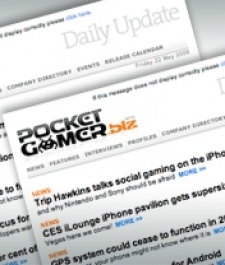With trips to San Francisco for some of the team, and trips to Sainsbury's for others, it's been a typically hectic week here at PG.biz: the home of news and views on the business of app stores, smartphone platforms, developments in mobile game making and assorted technology.
The release of Apple's quarterly financials meant another week of headlines for the Cupertino giant was pretty much guaranteed. The figures themselves, however, generated mixed feelings.
On the one hand, CEO Tim Cook revealed Apple had shipped more than 70 million iPhones during FY 2011, along with 32 million iPads. For some, however, news that iPhone shipments for the most recent quarter actually dipped to 17 million was a touch disappointing.
Indeed, that's probably one of the few downsides to the mass hysteria that seems to surround Apple these days: so much is expected by so many, that when the real figures come out, it's hard to match up.
In terms of actual profits, however, Apple pulled in $6.62 billion for the quarter up 54 percent year on year, and narrowly ahead of rival Microsoft, which made $5.74 billion across roughly the same period.
The drive for 5
Skip back a few days, however, and it was iOS 5 rather than the size of the firm's bank balance that Apple was most excited about.
Internal figures revealed 25 million upgraded to the latest version of the OS within its first five days a figure Localytics claimed represented almost a third of valid iOS devices.
Speculation also suggested the firm's latest handset, iPhone 4S, was actually intended as a budget release designed to compliment, rather than precede iPhone 5.
The latter, it's alleged, had been Steve Jobs's little baby, with its release next summer likely to act as his parting shot at Apple's rivals.
But while Apple finds itself going from strength to strength, Finnish manufacturer Nokia is hoping the launch of its first Windows Phone devices expected to be unveiled to the world next week will put the firm back on the straight and narrow.
The firm's financial results actually beat expectations net sales coming in at 8.98 billion ($12.41 billion) but an overall operating loss of 71 million ($98 million) never makes for all too many happy headlines.
Other negative news for Nokia came in the form of InMobi's latest report on ad impressions across its network in Europe, which for the first time saw the company replaced at the top of the tree by Android.
Indeed, this week saw further changes at the top. Figures obtained by the Wall Street Journal suggest Samsung shipped 20 million smartphones during its most recent quarter - a figure that would not only place it above Nokia as the world's top smartphone vendor, but also previous champion Apple.
Tight at the top
Samsung's shipment tally is only likely to rise in forthcoming quarters, too. This week saw the unveiling of the firm's latest Android handset the Google branded Galaxy Nexus coupled with Android 4.0's debut.
Better known as Ice Cream Sandwich, the latest version of Android appears to 'borrow' elements from both iOS and Windows Phone - the platform's 'people hub' will look suspiciously familiar to those currently running Microsoft's OS.
It seems Google and Samsung were particularly worried about poking rival Apple with the launch of Galaxy Nexus, however.
Though his comments have since been disputed by colleagues, Samsung mobile president Shin Jong-kyun is quoted as saying the Korean manufacturer designed the handset with the express intention of avoiding clashing with Apple's patent library understandable given the two firm's recent tussles in courtrooms around the globe.
But while Galaxy Nexus and iPhone 4S appeal to the high end of the market, both ARM and Qualcomm are currently in the process of targeting those looking for entry level devices.
Power play
ARM claims its latest Cortex-A7 MP core can deliver the same level of power, if not more, as current dual-core chips, albeit using far less energy. The end result is, manufacturers can push out cheaper handsets that aren't hampered when it comes to performance.
Microsoft's partnership with Qualcomm, too, has delivering most cost-conscious handsets in mind.
According to Windows Phone chief Andy Lees, manufacturers should be able to deliver sub-$200 handsets in 2012, thanks both to an increase in volume and Qualcomm's ability to serve up chips specifically designed for the needs of Microsoft's OS.
Despite Windows Phone's advancements and, indeed, the unveiling of BlackBerry's latest platform BBX - the battle at the top remains a two-way content between Apple and Google, however.
As such, the pending release of one of the first Steve Jobs biographies since his death, authored by Walter Isaacson, has unearthed the former CEO's thoughts on iOS's main rival, Android.
"I'm going to destroy Android, because it's a stolen product," he is alleged to have said.
"I'm willing to go thermonuclear war on this. I will spend my last dying breath if I need to, and I will spend every penny of Apple's $40 billion in the bank, to right this wrong."
The rate Android is growing, it won't take $40 billion to take the platform down. Try 40 years.
PG.biz week that was: Apple's ships 70 million iPhones, Samsung looks to avoid patent play with Galaxy Nexus, and Jobs real thoughts on Android hit the web
The past seven days' news compressed bite-sized






















